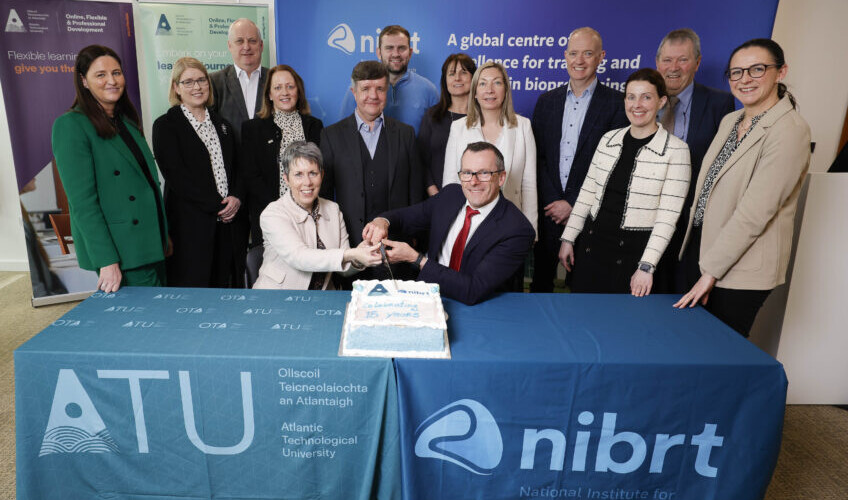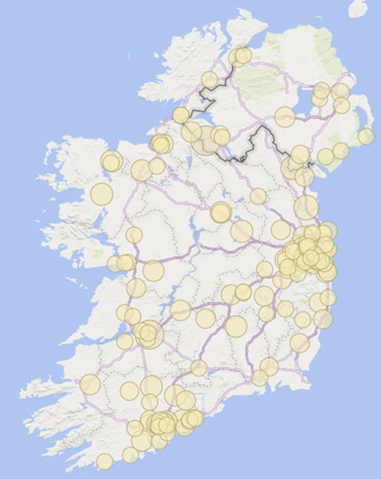
Addressing Biopharmaceutical Industry needs through focused collaborative Life Sciences education
Who we are
Atlantic Technological University (ATU) is a multi-campus technological university in the west and northwest of Ireland that delivers a rich combination of academic and research excellence, quality of life and opportunity. ATU’s Department of Life Sciences coordinates a long-standing external partnership with the National Institute of Bioprocessing Research & Training (NIBRT).
Since its establishment by IDA Ireland in 2007, NIBRT has successfully delivered comprehensive training in a unique simulated pilot-plant environment to over 45,000 people. NIBRT moved to a purpose-built facility in Dublin in 2011, and has recently expanded to over 8,000m2 of dedicated biomanufacturing training and research space.
A primary objective of the innovative ATU–NIBRT partnership has been to align with and directly address national strategy and policy, in particular Ireland’s National Skills Strategy 2025 (DFHERIS 2021). This has led to the development of a growing suite of accredited joint higher education programmes in Biopharmaceutical Sciences.
What we did
The core objectives of the ATU–NIBRT initiative were to:
- Provide a pathway for graduates to develop theoretical and practical skills for a successful career in the sector.
- Enable industry employees to broaden expertise, fostering further career development.
- Deliver excellent flexible higher education in a supportive environment with a strong focus on pastoral care for a growing student body.
- Meet specific industry needs in the region, Ireland and globally, offering opportunities for skills development and lifelong learning.
Over the past 15 years, a single initial programme has blossomed into a dynamic and strategic collaboration offering 24 higher-level courses, where graduates are equipped with the skills and confidence to excel in their chosen career.
Throughout this time, there has been a progressive development in educational offerings closely matched with a rapidly evolving industry sector, inherently necessitating:
- flexibility and adaptation during rollout of a suite of impactful higher education offerings.
- joint deployment of resources to support development and planning.
- extensive consultation with biopharmaceutical senior management and operational leaders including those who have responsibility for upskilling/reskilling and hiring initiatives within their organisations.
The ATU–NIBRT initiative has equipped learners with applied skills to work in high-tech Biopharmaceutical production facilities, incorporating best practice instructional design and pedagogies to generate a blend of theoretical sessions, practical scenarios and additional interactive workshops.

Figure 1: NIBRT’s state-of-the-art training suite
The suite of minor and major university awards established offer flexibility, with part-time and full-time offerings and progression routes from Level 6 (Higher Certificate), up to Level 9 (MSc), aligned with career development pathways.
Remote access has also enabled learners to continue studies whilst in employment or with erratic schedules and/or shift-working, given currently over half of learners are industry employees. Analysis of one class group showed less than 2% of students enrolling were unemployed, while the vast majority of students were currently employed.
As part of the continued development and ongoing evolution of the ATU–NIBRT partnership, we consulted extensively with Life Science industry representatives to reflect on current and planned provision and assess emerging challenges and skills gaps. ATU–NIBRT programmes also directly addressed regulatory requirements.
Impact Achieved
The ATU–NIBRT initiative has successfully delivered on its principal objective to directly address significant industry needs through the provision of focused, collaborative Life Sciences education.
Life Sciences sector
Both national and international manufacturing clients benefitted from NIBRT’s customised offerings and hands-on practical training, with employees from over 766 companies taking the opportunity to upskill/reskill through the ATU–NIBRT partnership between 2020 and 2023.

Figure 2: Heat Map indicating locations of learners upskilling/reskilling on ATU–NIBRT HE programs during 2020–2023
The industry-relevance of the programmes is evidenced by their sustained successes in attracting competitive funding via Springboard+, an EU-funded, Irish government-led initiative that aims to support key growth sectors of the economy providing free and heavily subsidised upskilling and reskilling opportunities through higher education in areas of identified skills need.
Cumulatively, the ATU–NIBRT initiative has contributed to sector growth by meeting demand for skilled personnel and thereby positioning Ireland to attract further investment into its successful Biopharmaceutical ecosystem.
Students
Over the last 5 years, ATU–NIBRT programmes have maintained a 90-95% completion rate and have consistently seen more than 80% of graduates at Level 9 achieving Honours/Distinction. Over 5,000 learners have been reached to date. All learners received a highly relevant, targeted, and industry-focused experience.
The relevance and impact of the programmes for students seeking to develop within their chosen career is illustrated in testimonials. For example:
“The Bio-Industry 4.0 course was relevant, topical, and well presented, with up-to-date content and reference materials. The lecturers showcased the latest trends in biopharmaceutical production supported by smart technologies. ATMP manufacturing and digital transformation were brought to life through discussions with industry professionals and solution providers.”
“NIBRT has been central to my learning goals since I undertook upgrading my qualifications through IT Sligo (now ATU). The approach to learning is a hands-on one and is set in a fully simulated biopharmaceutical environment. This makes learning visual and makes learning easy no matter what your level of experience”.
“Assistance and tutoring provided during my L6 Biopharmaceutical Processing course has helped me secure a Senior Bioprocessing Associate role in a biopharmaceutical company in my hometown, which is of great benefit to me. The support provided throughout the course was greatly appreciated; without the knowledge passed on through the course, this would not have been possible”.
“I completed my ATU Master’s course in Biopharmaceutical Science in 2011, 12 years after finishing my Bachelor’s degree in mechanical engineering. My Master’s course provided me with the knowledge and skills to transition from API manufacturing roles into biologics manufacturing operations. Overall, the course was a highly enriching experience that I would recommend to anyone seeking out careers in the Biopharmaceutical Industry”.
Figure 3: Students participating within NIBRT’s state-of-the-art training facilities
Global health
While the direct beneficiaries are students and the Irish Life Sciences sector, by advancing global, innovative and lifesaving therapies, the initiative has also made a significant contribution to improving the health, wellbeing and quality-of-life of people nationally and internationally availing of the vast array of medicinal, biotechnology, and MedTech products, including cell/gene therapy and vaccines.
What we learned
- A strong partnership between a HEI and external training provider can synergistically provide customised, competency-based, engaged training programmes to serve industry needs.
- Remote access and the use of advanced flexible innovative online learning approaches helps to maximize participation, engagement, and student/graduate outcomes.
- New employee/trainee exposure to industry-based tutors/guest speakers and practical-oriented sessions empowers learners and provides relevant networking opportunities.
- Providing opportunities to gain practical expertise in NIBRT’s purpose-built industry-simulated environment incorporates real-life production scenarios which meets learner and industry needs.
- Proactive engagement with students and external stakeholders over many years provides key insights and learnings that inform continued evolution and innovation of programmes. For example, ATU–NIBRT has used feedback to inform the establishment and evolution of ATU–NIBRT major and minor awards, including novel micro-credentials. Such innovation further establishes the global reputation of ATU–NIBRT and Ireland’s place in the international Life Sciences arena.


